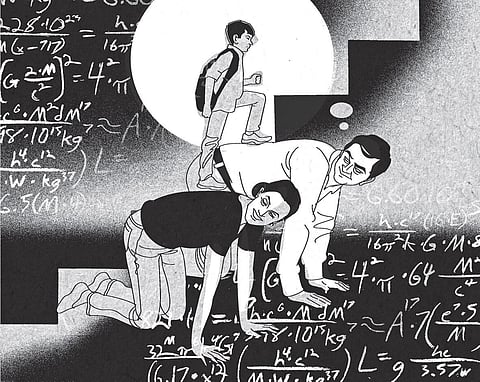

On July 27, a Class XI schoolboy allegedly ended his life at his home in Sivaganga district in Tamil Nadu the fifth such incident in the state in two weeks. He was finding maths and biology difficult, the boy said in his suicide note. Before this, four schoolgirls had died by suicide. The series of student deaths seem to be pointing at a more disturbing trend India is witnessing in recent years. It is slowly turning to be the suicide hotspot of the world.
According to the data by National Crime Records Bureau (NCRB), India recorded over 1.53 lakh suicides in 2020. What is ironic is that the suicide rates are higher in relatively prosperous states such as Kerala, Tamil Nadu, Andhra Pradesh and Telangana, than in the poorer states of northern India. Also, there are more suicides among the affluent and middle class than among the impoverished. Before the pandemic, 11,396 children ended their lives in 2020, an average of 31 teenagers every day.
The pandemic played havoc with the teens’ social lives at the most crucial age of their development, as it wrecked their academic schedules and drove them to screen addiction. Though we have to wait for the NCRB data on teen suicide for 2022, one need not be surprised if more teenagers have taken the extreme step in the last two years. As a father of two teenaged children, I was deeply disturbed by the news of two kids from their peer group ending their lives last week.
In the West, if teenage suicide causes were mainly attributed to drugs-related problems and crime, in India, it has got to do more with academic pressure, love affairs and family issues. Often, the unfortunate parents are caught by surprise as they are too busy, working too hard to provide a better life for the next generation. Or the burden of expectations that the parents, peers and academic institutions pile up on the teenagers becomes too heavy for them to handle, and they snap without warning. Indian students are forced to face some of the toughest competitive examinations in the world.
Too many kids fight out for too few seats in hallowed academic institutions. They are forced to sacrifice everything that gives them some pleasure and fun in life to mug up answers to questions that they would most probably never encounter in their life after the examinations. When we start measuring a teen’s worth based on their grade, we have failed as a society. This is not a new phenomenon. I remember the pressure I faced as a teenager, preparing for the engineering entrance examination. To add to my woes, I abhorred mathematics. Getting admission into a professional college was only the beginning of the suffering. I loved everything about my college, except the subjects I studied. I learned everything from my college, except the subject I specialised in.
I graduated in engineering because it seemed everyone in our peer group was studying either that or medicine. Few of us loved the subject, and only a handful are making a living as engineers now. The country wasted so many resources on us. I won’t be surprised if this is not for most of your peers. The countless and joyless hours I spent studying subjects I hated to haunt my nightmares even now, after three decades. I won’t wish that fate on my greatest enemies, let alone my children.
Yet, we make our children go through the same grind mercilessly. That an education app sponsors the Indian cricket team says a lot about the commercialisation of academics in India. The coaching centres for competitive examinations have sprouted in every seedy ally in most of our towns. Children are made to practise mind-numbing multiple choice questions for hours every day. A few get squeezed into some elite education institutions. Many more get pushed into private colleges if their parents can afford the hefty capitation fee after pawning jewels, liquidating their life savings and selling their homes. And the majority gets chewed out of these coaching factories as effluents, with their confidence broken, feeling worthless and filled with self-doubt and self-loathing.
The parental and peer disapproval for not succeeding well enough in subjects they have scant interest in and the lack of social life leads to depression. Is it any wonder then that so many of our children are taking the extreme step? Maybe there are other reasons for an increase in the rate of suicide. But the least we can do is to stop putting so much importance on academic performance. If you are already past your teens, you are perhaps aware that there is a scant relationship between success in life and academics, whichever way you define success. If you are a teenager reading this, please understand that the life ahead will be beautiful, and a few marks, more or less, will not make any difference to it. If you have got fewer marks than your friends, celebrate it. If you have got better grades than your peers, celebrate that too. Either way, the grades don’t matter. Only life does.
Anand Neelakantan
mail@asura.co.in
Author of Asura, Ajaya series, Vanara and Bahubali trilogy